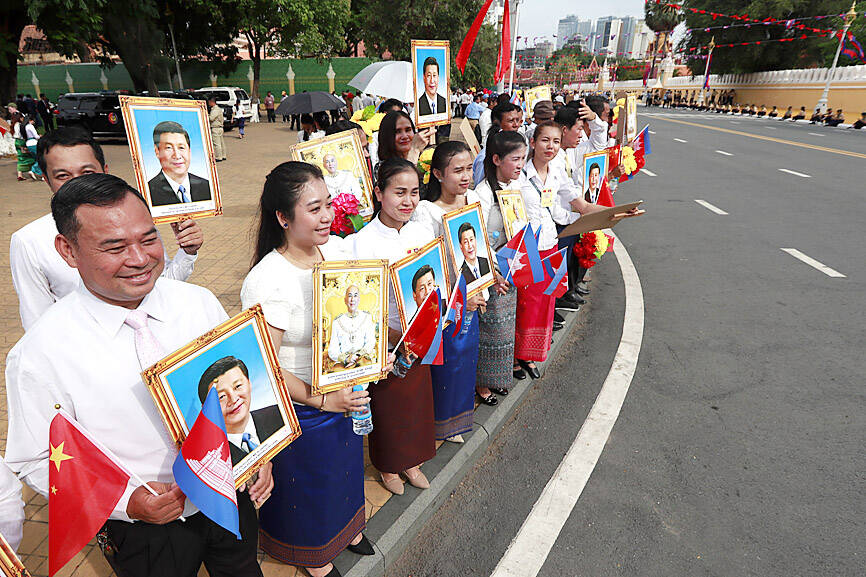Chinese President Xi Jinping (習近平) yesterday arrived in Cambodia for a two-day state visit.
The visit, Xi’s first since 2016, concludes a three-nation Southeast Asian tour that included stops in Vietnam and Malaysia.
Xi was formally greeted at the airport in Cambodia’s capital, Phnom Penh, by Cambodian King Norodom Sihamoni.

Photo: EPA-EFE
During his visit, Xi was scheduled to meet Cambodian Prime Minister Hun Manet and Cambodian Senate President Hun Sen, who is Hun Manet’s father and predecessor as prime minister.
In a statement at Phnom Penh International Airport after his arrival on his presidential aircraft, Xi said he was “delighted” to visit again.
“Cambodia is a priority in China’s neighborhood diplomacy. China will unswervingly support Cambodia in upholding strategic autonomy and in pursuing a development path suited to its national conditions,” he said, according to a transcript of his remarks distributed by the Chinese embassy.
Trade was likely be a major topic of Xi’s discussions in Cambodia, which faces among the highest tariff rates proposed by Washington.
China is presenting itself as a source of stability and certainty as Southeast Asia scrambles to respond to tariffs imposed by US President Donald Trump, which threaten the region export-oriented economies whose largest markets are generally the US.
In addition to a universal 10 percent tariff, the country faces the threat of a 49 percent tax on exports to the US once a 90-day pause expires.
In addition to discussions on improving bilateral ties, and regional and international issues, several agreements were expected to be signed on cooperation in various sectors.
The visit comes on the 50th anniversary of the April 17, 1975, takeover of Cambodia by the communist Khmer Rouge, which imposed a reign of terror with Maoist-inspired policies that saw an estimated 1.7 million Cambodians die of starvation or overwork, as well as executions.
Beijing was the main foreign backer of the Khmer Rouge and supported the group in carrying on a guerrilla war after it was ousted from power in 1979 by an invasion from Vietnam.
Cambodia’s rapid growth in the past few decades has been fueled largely by Beijing.

INVESTIGATION: The case is the latest instance of a DPP figure being implicated in an espionage network accused of allegedly leaking information to Chinese intelligence Democratic Progressive Party (DPP) member Ho Jen-chieh (何仁傑) was detained and held incommunicado yesterday on suspicion of spying for China during his tenure as assistant to then-minister of foreign affairs Joseph Wu (吳釗燮). The Taipei District Prosecutors’ Office said Ho was implicated during its investigation into alleged spying activities by former Presidential Office consultant Wu Shang-yu (吳尚雨). Prosecutors said there is reason to believe Ho breached the National Security Act (國家安全法) by leaking classified Ministry of Foreign Affairs information to Chinese intelligence. Following interrogation, prosecutors petitioned the Taipei District Court to detain Ho, citing concerns over potential collusion or tampering of evidence. The

‘FORM OF PROTEST’: The German Institute Taipei said it was ‘shocked’ to see Nazi symbolism used in connection with political aims as it condemned the incident Sung Chien-liang (宋建樑), who led efforts to recall Democratic Progressive Party (DPP) Legislator Lee Kun-cheng (李坤城), was released on bail of NT$80,000 yesterday amid an outcry over a Nazi armband he wore to questioning the night before. Sung arrived at the New Taipei City District Prosecutors’ Office for questioning in a recall petition forgery case on Tuesday night wearing a red armband bearing a swastika, carrying a copy of Adolf Hitler’s Mein Kampf and giving a Nazi salute. Sung left the building at 1:15am without the armband and apparently covering the book with a coat. This is a serious international scandal and Chinese

Seventy percent of middle and elementary schools now conduct English classes entirely in English, the Ministry of Education said, as it encourages schools nationwide to adopt this practice Minister of Education (MOE) Cheng Ying-yao (鄭英耀) is scheduled to present a report on the government’s bilingual education policy to the Legislative Yuan’s Education and Culture Committee today. The report would outline strategies aimed at expanding access to education, reducing regional disparities and improving talent cultivation. Implementation of bilingual education policies has varied across local governments, occasionally drawing public criticism. For example, some schools have required teachers of non-English subjects to pass English proficiency

TRADE: The premier pledged safeguards on ‘Made in Taiwan’ labeling, anti-dumping measures and stricter export controls to strengthen its position in trade talks Products labeled “made in Taiwan” must be genuinely made in Taiwan, Premier Cho Jung-tai (卓榮泰) said yesterday, vowing to enforce strict safeguards against “origin laundering” and initiate anti-dumping investigations to prevent China dumping its products in Taiwan. Cho made the remarks in a discussion session with representatives from industries in Kaohsiung. In response to the US government’s recent announcement of “reciprocal” tariffs on its trading partners, President William Lai (賴清德) and Cho last week began a series of consultations with industry leaders nationwide to gather feedback and address concerns. Taiwanese and US officials held a videoconference on Friday evening to discuss the